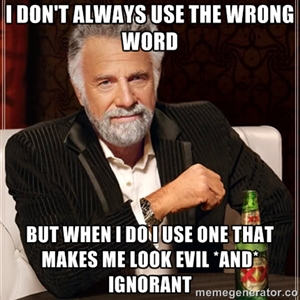
On March 5, as a winter storm approached, I posted this on Facebook:
If you want to be my friend, do not — repeat, do not — repeat or use an annoying portmanteau “word” such as “snowquester,” “snowpocalypse” or “snowmageddon.” And realize for these constructions to be clever, the replaced syllable should actually sound like the original syllable.
On March 6, a friend posted a link to a Slate.com article titled: “Please Do Not Chillax: Adjoinages and the death of the American pun,” published that morning.
We have a word for that, and it isn’t synergy.
Anyhow, I learned from the article that this type of awkward construction is called a neolexic portmanteau, as distinguished from a true pun. Bridezilla, stagflation and chillax (I hadn’t heard that one) are neolexic portmanteaux, whereas they classify bromance, gaydar and staycation as puns because rather than simply trying to jam two dissimilar words together, there is the attempt to replace a syllable or syllables with similar sounds.
I suppose it says something about human creativity and the wily nimbleness of English that these words exist. Maybe it also says something about our culture that a close male friendship is mildly derided as a bromance or a female activist seeking equal treatment could be labeled a feminazi.
Then again, it also pegs us as a culture prone to gross exaggeration (Obamanation, anyone?). Case in point: we got less than an inch of snow last night. Snowmageddon, indeed.
— Otto E. Mezzo









